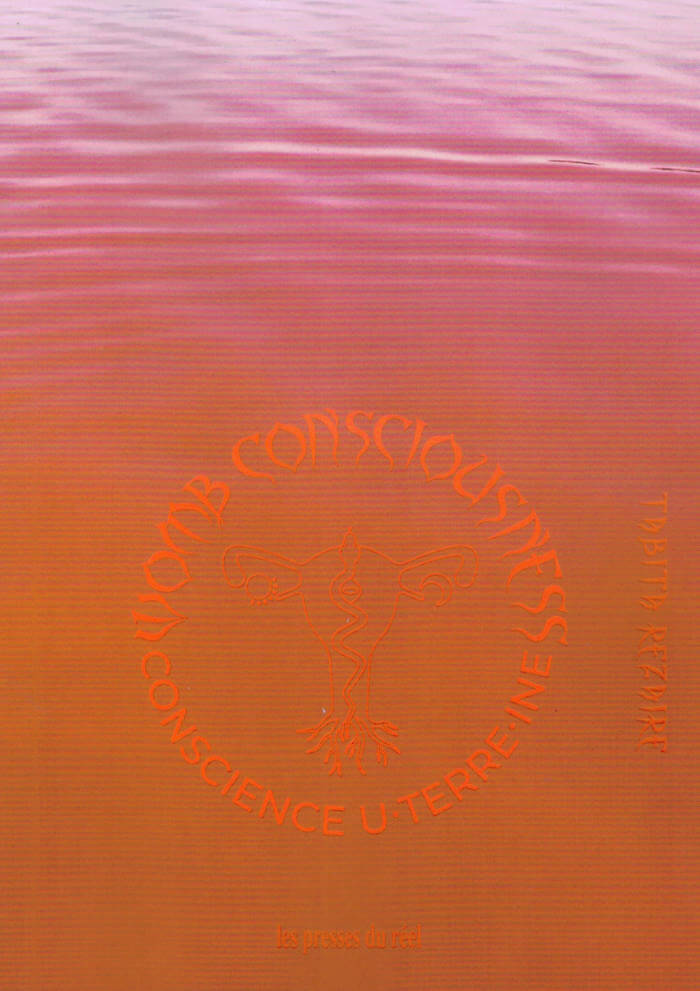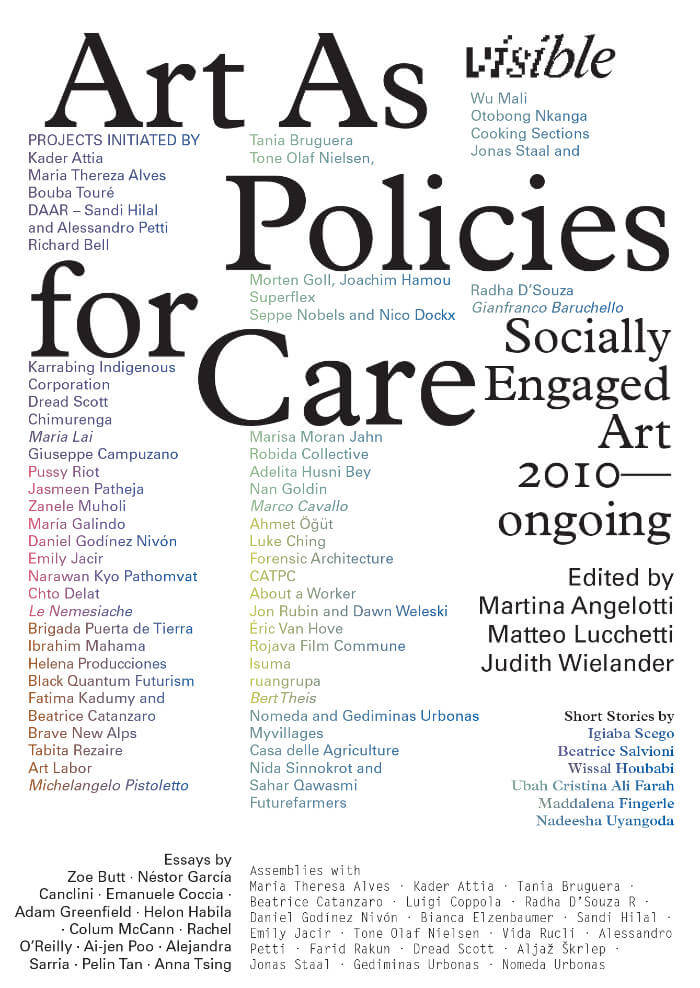Tabita Rezaire
Tabita Rezaire

Womb Consciousness
This collective publication is a singular invitation to discover or deepen the universe of Tabita Rezaire, at the intersection of new technologies, decolonial healing, spirituality and the political history of science. Through numerous contributions from poets, theorists, artists and her friends and relatives, she invokes the wisdom of the womb: the mother womb, the earth womb, the cosmic womb, for us to receive its grace.
This book is part of a series of monographic publications co-published with the Espace multimédia Gantner devoted to women artists in connection with technology.
Tabita Rezaire (born 1989 in Paris) is an artist, yoga teacher, doula, and farmer. Her cross-dimensional practice envisions network sciences—organic, electronic and spiritual—as healing technologies. Embracing digital, corporeal and ancestral memory, she digs into scientific imaginaries and mystical realms to tackle the colonial wounds and energetic imbalances that affect the songs of our body-mind-spirits. Tabita Rezaire is based in French Guiana, where she is birthing AMAKABA (http://amakaba.org).
Rezaire's practice explores decolonial healing through the politics of technology, spirituality Navigating architectures of power—online and offline—her works tackle the pervasive matrix of coloniality . Disseminating light, her digital healing activism offers substitute readings decentering occidental authority, hoping to assist in the "dismantling [of] our white-supremacist-patriarchal-cis-hetero-globalized world screen".
And more

Visible – Art as Policies for Care – Socially Engaged Art (2010-Ongoing)
Judith Wielander, Matteo Lucchetti and 1 more
Comprehensive documentation on 43 outstanding socially committed artistic projects over the past twenty years.
The book Visible: Art as Policies for Care. Socially Engaged Art (2010–Ongoing) was born from the editors' enduring curatorial research into long-term situated art projects that exist within the social sphere, beyond the logic of the traditional art system, confronting unjust systems, and prefiguring novel visions for living together.
The socially engaged art projects collected here hold a significant place in the constantly evolving trans-local art scene of the past two decades, and form a lens through which to observe changing realities and their urgencies; they redefine the concept of art in light of current climatic, political, and social changes and foster the dematerialization of the artwork in processes that become policies of culture and care.
The publication is composed of four main sections with overarching photo documentation—interviews, essays, forums, and short literary texts—collecting contributions by artists, anthropologists, novelists, activists, and sociologists, such as Anna Tsing, Wissal Houbabi, Maria Thereza Alves, Tania Bruguera, Jonas Staal, DAAR - Decolonizing Architecture Art Research, Giuseppe Campuzano and Nan Goldin.
Edited by Martina Angelotti, Matteo Lucchetti, Judith Wielander.
Contributions by Ubah Cristina Ali Farah, Maria Thereza Alves, Martina Angelotti, Art Labor, Kader Attia, Gianfranco Baruchello, Richard Bell, Black Quantum Futurism, Brave New Alps, Tania Bruguera, Zoe Butt, Giuseppe Campuzano & Miguel López, Beatrice Catanzaro & Fatima Kadumy, CATPC, Marco Cavallo, Chimurenga, Luke Ching, Chto Delat, Emanuele Coccia, Cooking Sections, Luigi Coppola, Radha D'Souza & Jonas Staal, DAAR / Sandi Hilal & Alessandro Petti, Nico Dockx & Seppe Nobels, Maddalena Fingerle, Forensic Architecture, Futurefarmers, María Galindo, Néstor García Canclini, Daniel Godínez Nivón, Morten Goll, Adam Greenfield, Raphaël Grisey & Bouba Touré, Helon Habila, Helena Producciones, Sandi Hilal, Kim Hou, Wissal Houbabi, Adelita Husni Bey, Emily Jacir, Karrabing Film Collective, Selom Kudjie & Ibrahim Mahama, Zacharias Kunuk, Maria Lai, Le Nemesiache, Carolina Lio, Matteo Lucchetti, Wu Mali, Colum McCann, Marisa Morán Jahn, Zanele Muholi, Myvillages, Paolo Naldini, Jesús "Bubú" Negrón, Tone Olaf Nielsen, Otobong Nkanga, Rachel O'Reilly, Ahmet Öğüt, P.A.I.N., Jasmeen Patheja, Narawan Kyo Pathomvat, Michelangelo Pistoletto, Ai-jen Poo, Pussy Riot (Nadya Tolokonnikova), Sahar Qawasmi & Nida Sinnokrot, Tabita Rezaire, Robida, Rojava Film Commune, ruangrupa (Farid Rakun), Jon Rubin & Dawn Weleski, Beatrice Salvioni, Alejandra Sarria, Igiaba Scego, Dread Scott, Superflex, Pelin Tan, Bert Theis, Anna Tsing, Nomeda & Gediminas Urbonas, Nadeesha Uyangoda, Éric Van Hove, Judith Wielander, Andrea Zegna, Anna Zegna.

TRANSMISSION – CENSORED 05
Dans ce numéro, Censored explore les parcours de militant·es d’hier et d’aujourd’hui qui ont marqué l’histoire, l’enjeu politique des archives, ou encore la traduction féministe. Il aborde les influences entre l’art et les années sida, le traumatisme racial comme un enjeu de santé publique, la transmission intergénérationnelle avec des textes intimes. Censored s’est aussi intéressé à l’hétérosexualité comme système politique et à la déconstruction de la famille nucléaire.
Ce nouveau numéro présente une grande nouveauté, des cartes blanches à cinq artistes: Naïa Combary, Clara Pacotte et Charlotte Houette (EAAPES), Camille Soulat, Roxanne Maillet, Tabita Rezaire.

Fórum do Futuro – Vita Nova
Jenna Sutela, Filipa Ramos and 2 more
A collective book that proposes to question human and non-human existence in the current social context, spanning different cosmogonic views.
The Vita Nova editorial project had its genesis in the Fórum do Futuro: a programme of debates, artist talks, and performances, held annually in the city of Porto, that brings together guests from different artistic and scientific practices to reflect on fundamental issues for contemporary societies. Given the impossibility of holding the 2020 edition, due to the challenges posed by the pandemic, the Fórum do Futuro is instead presenting a book that proposes to question human and non-human existence in the current social context, spanning different cosmogonic views. The book consists of four thematic sections that combine different artistic, scientific, philosophical and technological perspectives in written and visual essays, stories and interviews.
Texts by Sophia Al-Maria, K Allado-McDowell, Shumon Basar, Guilherme Blanc, Rosi Braidotti, Octavia Butler, Ted Chiang, GPT-3, Alexis Pauline Gumbs, Kirsten Keller, Filipa Ramos, Tabita Rezaire, Jenna Sutela, Denise Ferreira da Silva, Suzanne Treister, Aby Warburg, Chandra Wickramasinghe, Feifei Zhou.